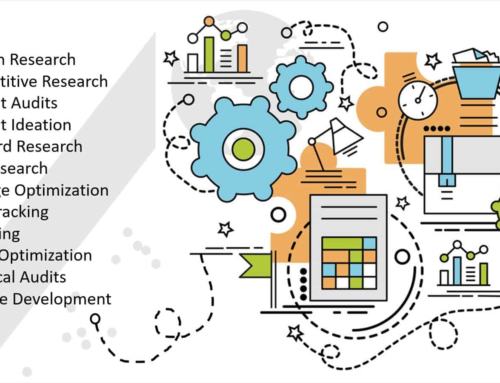Estimated Read Time: 10 Minutes
Small business owners are notoriously strapped for time and money. Every investment decision must be carefully weighed and considered.
Search engine optimization (SEO) is a long-term investment, a process that requires significant time, effort, and dollars to produce sustained and meaningful results. As such, it begs the question, “is SEO worth it for small businesses”?
Why Even Consider It
Small business owners aren’t the only ones who are watchful about how they spend their time and money. With run-away inflation and COVID-forced physical distancing, consumers everywhere are looking for ways to quickly and easily find and compare product and service offerings by availability, features, reviews, and price and they’re finding one of the best places to do that is online. Whole consumer segments have shifted to online shopping for the convenience, safety, and greater selection it provides.

Whole consumer segments have shifted to online shopping.
Even before the pandemic, in December 2020, Raydiant surveyed 1,000 US consumers and learned that 54% prefer to shop online rather than in person. 48% of respondents said they had replaced products they typically purchased at a physical store with competitors’ online alternatives in just the past year. 25% said they switch brands more often today than ever before.
So what are marketers doing to optimize their digital marketing strategies? Late in 2019, Ascend2 surveyed 278 marketers to ask that very question. They learned respondents’ top two objectives were to increase sales leads (54%) and acquire more customers (49%). Roughly half said they considered SEO (49%) and social media / blog posting (47%) to be the two most effective digital marketing tactics available to help them achieve those objectives.
That is not surprising. SEO has many benefits. It increases organic discovery and high-quality website traffic. It offers an impressive return on investment (ROI), increases your brand awareness, credibility, and trust, and lets you promote your goods and services 24/7, 365 days of the year. Not only that, SEO optimizes visitor experiences with your website so they leave satisfied and are more likely to tell others about you and advocate on your behalf.
So what is SEO?
What Is SEO
SEO stands for “search engine optimization”. It is the process of improving your business’s visibility and rankings in search results so you can attract more visitors to your website and turn them into brand loyalists and customers. It improves the user experience with your website by helping people find the information they came looking for and ensuring they leave satisfied.
Blog posting and social media are integral parts of SEO because they open pathways to your website where you can provide free and useful information to your target audience.

SEO is not black magic and it is not a trick. It won’t generate demand where demand doesn’t exist and it won’t sell bad products or services. What it can do though, is get you in front of highly-qualified, ready-to-buy customers when they are searching for the information, goods, and/or services you provide. It increases your visibility, awareness, and appeal by highlighting and reinforcing your brand relevance, authority, and trustworthiness. It effectively showcases the quality of your business and website to the people who might be interested in engaging with you.
How Difficult is SEO
Bad SEO is easy. Good SEO is hard.
Gone are the days when one could quickly and easily manipulate Google into positioning you at the top of search results with mediocre content and a few easily acquired backlinks. If anyone is telling you that today, they are living in a time-bubble from the 1990s or optimizing a business with very little to no competition.

If you are a small, local e-commerce business, it is not reasonable to expect you could possibly outrank a global e-commerce giant like Amazon.com
SEO can have a noticeable positive impact on your business but you need to bear in mind that its potential is only as good as your business. If you have a business that produces goods and services that nobody wants, there aren’t any tricks an SEO can provide to create demand and increase sales. If you are a small, local e-commerce business, it is not reasonable to expect you could outrank a global e-commerce giant like Amazon.com. As Google’s Maile Ohye has said, “SEO helps you put your best foot forward so that it ranks appropriately, in the spot where an unbiased potential customer would expect your site to be seen“. So before you even consider starting, align your expectations accordingly.
Then, for SEO to be successful, the experience prospects and customers have with you, both on and offline, must be differentiated, value-driven, and outstanding. A good SEO will examine your website holistically, starting from when a searcher begins their search through to the point where they have accomplished what they set out to do. Your website’s technical architecture, content, and online reputation are reviewed from the perspective of a searcher and search engine. It is compared to your brand promise, other options available in the marketplace, and a strategy developed to close gaps and take advantage of opportunities. Finally, approved tactics are implemented.
Keep in mind the world does not stand still while all this is taking place. Google changes its ranking algorithm as much as nine times a day. Demand rises and falls. Competitors compete. A good SEO must be prepared to adapt to changing circumstances in order to keep pace.
SEO is not easy. Nor is it cheap.
How Expensive Is SEO
If you haven’t guessed it already, good SEO can be expensive because the amount of work that goes into accomplishing success is substantial, and the number of people who know how to do it and do it well, is small. To be a successful SEO, you need technical, analytical, creative, strategic, and communication skills, all rolled into one. You need to keep up with ever-changing technological advancements, search engine ranking algorithms, and the marketplace. You need to carefully and simultaneously balance the needs and best interests of searchers, the business, and yourself.

It takes time to build this kind of expertise. It takes time to come up with a unique strategy for every business. And it takes time to implement the strategy, bearing in mind that you may need to change direction along the way.
As such, SEO is a process, a series of ongoing activities that are all geared toward helping both you and your target audience. I draw attention to this important distinction because, in my experience, many small business owners believe SEO is something that can be done quickly and for little cost – like flipping a switch on and off. Unfortunately, that’s just not the case. SEO is hard work. It takes a long time. It requires continuous upkeep and maintenance. And it can be expensive.
Is It Worth Doing If You’re a Small Business
So, is SEO worth it for small businesses?
Yes. SEO is worth the time, effort, and dollars for small business owners because SEO is the best investment you can make to gain visibility with the vast majority of people who enjoy the convenience, safety, and greater selection of online shopping. You’ll need the right partner and strategy to make it work, but it is definitely worthwhile.
Here’s why.
- Every small business needs a website. A well-designed website provides evidence you are a legitimate business, showcases your product and service offerings, and gives you an opportunity to begin to convince people you can help them.
- Second, an unoptimized website has limited value as an online brochure. An optimized website, on the other hand, increases your online visibility and credibility by demonstrating evidence of your know-how and effectiveness. A majority of the US population (79% or 263 million consumers) shopped online for goods and services in 2021 and, as previously mentioned, 54% prefer to shop online. An optimized website opens a doorway to those consumers.
- Third, roughly half of US marketers consider holistic SEO, the process of improving all important aspects of a website including its technical architecture, content, and online reputation, to be the most effective digital marketing tactic available to help them increase sales leads and acquire more customers. SparkToro did a study in 2018 that revealed Google is the single-largest traffic driver to websites. It accounts for 57.8% of traffic to an average website.
- Holistic SEO delivers sustained and compounding value over time. That value can and has been measured.
- Profitworks estimated that the average return on investment for its SEO services in 2015 was 275%.
- In 2020, Terakeet calculated the SEO ROI for its clients was between 500 and 1,220%.
- Last year (in 2021), FirstPageSage determined its average 3-year ROI for SEO as 748%.
The best alternative to SEO is Google’s Pay-Per-Click (PPC) advertising. PPC advertising also requires skill to implement effectively. It can, however, be set up fairly quickly and the results measured. The problem is, a vast majority of people ignore PPC ads (source and source) and the results are only short-lived. (Advertisements stop displaying in search results as soon as you stop paying for them.) PPC should definitely be considered as part of your marketing strategy – especially if you want to build awareness quickly – but it does not negate the long-term value SEO can bring to your business.
So yes, it is worth doing SEO if you’re a small business because you need a website anyway and holistic SEO increases your online visibility and has been proven to be the most effective marketing tool to increase leads and acquire new customers – the top two goals of most businesses.
How to Structure Small Business SEO Investment
So then the question becomes, what is the best way for small business owners to structure their SEO investment so it doesn’t become overly burdensome.
There are a few things you can do.
First, I always recommend an initial consultation with an SEO so you can quickly gauge the size of the mountain you’re going to have to climb to see meaningful results. Some SEO companies offer free consultation you can take advantage of to help figure this out.

Second, if you have the time and the skills but not the budget, SEO can be learned. Aleyda Solis has created an extremely helpful online roadmap to help guide you through the process of learning SEO or expanding your SEO knowledge. It covers everything from SEO strategy to measuring and reporting results and more. Google also shares some good do-it-yourself (DIY) resources on their Search Central Blog:
-
-
- an SEO starter guide describing much of what an SEO can do for you and how you can go about it;
- details on how Google crawls, indexes, and serves the web;
- a video series on how to build an online presence for your business; and
- Google Webmaster Guidelines.
-
Third, some SEO companies offer coaching services that can help you climb the learning curve faster and avoid some of the problems most people encounter when they’re first starting out. Google has recommendations for how to choose a good SEO in their starter guide and on Youtube. We also have some suggestions for how to vet a SEO company so you get what you want and need.
If you don’t have the time or skills needed to be successful at SEO, then it becomes a financial consideration. Forbes has written an excellent article on how to go about calculating the return you’ll earn from your investment versus the cost of an SEO alternative, PPC. Then, I always recommend a website and competitive assessment. This won’t be free, but it will help you get your head around how much change is needed and whether you can realistically support an ongoing SEO process. It will also help you determine a realistic budget and time commitment. Based on that, you can decide how much you’re willing to invest, if anything, to see results.
Summary and Conclusion
So that’s it.
Is SEO worthwhile for small businesses? Yes. Done well, SEO increases your brand awareness, visibility, and rankings in search results. It helps you turn website visitors into brand loyalists and customers. It has an excellent return on investment.
That said, good SEO isn’t free. It costs time, effort, and dollars which can be an expensive and daunting proposition for many small business owners. You would be wise to get an initial SEO consultation and to consider alternative options including learning how to do it yourself, SEO coaching services, and pay-per-click advertising.
If you’re interested, B-SeenOnTop offers free consultations and coaching services to small business owners. Call us at (484) 437-7977 or fill out our contact us form and we’ll be in touch.
Featured Image: Photo by LinkedIn Sales Solutions on Unsplash








Leave A Comment